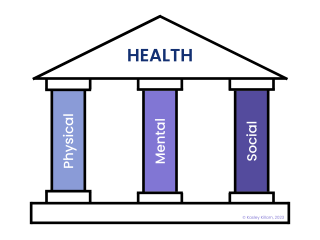Relationships
What Is Social Health?
You can have a strong body and mind, yet still feel unwell without it.
Posted February 14, 2023 Reviewed by Ekua Hagan
Key points
- Social health is the aspect of overall well-being that stems from connection and community.
- Social health is an emerging concept that is different from but connected to mental health and social determinants.
- While physical health relates to the body and mental health relates to the mind, social health relates to relationships.

How do you stay healthy?
Your answer probably includes exercising regularly, eating plenty of vegetables, and getting a good night’s sleep. From a young age, we’re taught the importance of physical health.
Your answer might also include things like stress management, therapy, or meditation. Increasingly, mental health is mainstream.
But it turns out that you can have a strong body and mind, yet still feel unwell if you lack meaningful relationships.
Introducing Social Health
Social health is the aspect of overall well-being that stems from connection and community. It’s about having close bonds with family and friends, enjoying a sense of belonging to groups, and feeling supported, valued, and loved.
To summarize decades of scientific studies, our relationships determine both how well we live and how long we live; connection is as vital to survival as food and water. For instance, research has shown that positive, satisfying relationships are one of the best predictors of health across the lifespan, whereas loneliness is more deadly than obesity. That’s why it’s helpful to distinguish social health as a distinct yet interconnected pillar of overall well-being.

Picture a Greek temple with three columns, where the temple represents overall health and the columns represent the physical, mental, and social components of health.
The columns support the temple by combining their strength. If you weaken or remove one column, you risk compromising the others and causing the whole structure to collapse; it’s a safety hazard. On the other hand, improving your social health can also help sustain your physical and mental health, and vice versa.
This means that if you nourish your body and mind but neglect your relationships, your well-being may be compromised—whereas prioritizing connection can help you live happier, healthier, and longer.
What Is Social Health Not?
It’s different from mental health, which encompasses psychological and emotional well-being and relates to our thoughts and feelings. Social health can both contribute to and be affected by mental health.
It’s also different from the social determinants of health, which encompass non-medical, societal factors that influence well-being, such as housing, transportation, education, and pollution. Relationships might be considered one such determinant, but that understates their significance.
By burying connection under the conversation on either mental health or social determinants, we lose sight of what an outsized impact it has—not just for emotions, but also for outcomes like heart disease and mortality. By elevating the idea of social health, we give relationships the credit they deserve and better understand that they need to be prioritized in our day-to-day lives, similar to nutrition and sleep.
Why Have I Never Heard of This Before?
If social health is new to you, that’s because it’s an emerging concept. When I first started researching this topic over a decade ago, the term was almost non-existent online and at the library, other than in a few academic papers. I used to get blank stares when I said “social health” in conversations.
In recent years, I’ve been writing articles, giving talks, and leading programs to spread this idea, and thanks to advocacy by colleagues and me, it’s gaining traction. Increasingly, “social health” is championed by nonprofit leaders, startup founders, researchers, and other leaders around the world. But the idea remains relatively unknown among the general public; my forthcoming book seeks to fill this gap.
Until then, here are resources to learn more and start strengthening your social health:
- Read about how to evaluate your social health.
- Get ideas for simple, research-backed ways to improve your social health.
- Watch a 15-minute introduction to social health at the Harvard Alumni Week.
- Watch a 30-minute overview at the Canadian Human Connection Conference.


